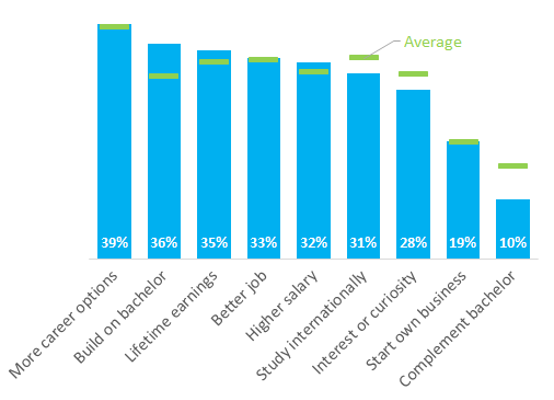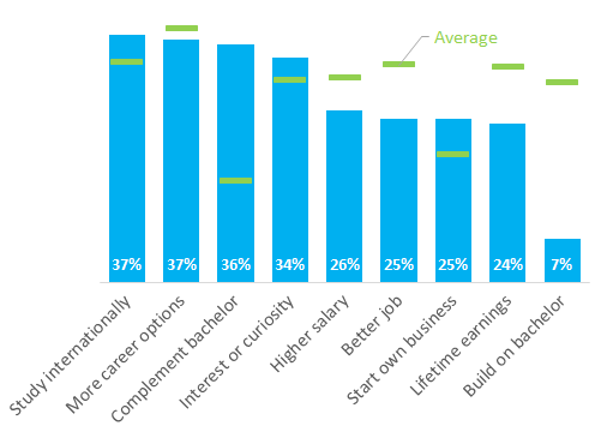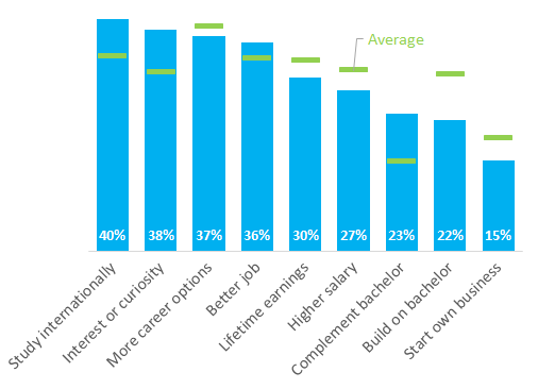Although the pandemic is impacting the plans of many students, their business school aspirations remain intact. This means that, while new considerations, such as the impact of the pandemic on job markets, come into play, the core motivations that drive undergraduates to pursue a business master’s degree remain largely the same.

Findings from the GMAC Undergraduate Survey show that these motivations vary depending on what undergraduates choose to major in or focus their bachelor’s studies on and the region they are from. By understanding this connection between major and motivation, universities can glean advice that will help them better recruit undergraduates for their business master’s programs. Segmenting majors into three groups—the business majors, the quants (STEM), and the poets (arts and humanities)—here’s what it revealed.
What motivates ‘the business majors’ to consider a business master’s?
A business master’s is the most popular graduate degree option for all undergraduates, but that is especially true among business majors. Why then is a bachelor’s degree in business a common precursor to a business focus in graduate school?
According to survey findings, it is largely about getting ahead. Students studying for a business-related bachelor’s degree are more likely to consider a business master’s for reasons relating to career and financial advancement. There are citizenship differences worth highlighting. North Americans are more focused on money, both as the degree is a way to increase their lifetime earnings (46%), and to facilitate higher salaries (42%). Those from the Indian sub-continent have the greatest interest in studying internationally (53%) and are the most likely to aspire to start their own business (31%). Europeans are focused on how it can increase career options (44%), while those from Greater China seek better job prospects (42%).

Universities looking to attract business undergraduates to their business master’s programs must speak to the motivations that business majors care about—career and financial advancement. When a university is planning their editorial calendar, for instance, they should focus on topics like how a business master’s advances career prospects during challenging market conditions, or the positive impact on salary, promotion potential, and career trajectory. Universities should also promote their career and support services, as these channels are a good way to connect candidates with data on everything from employment statistics to typical salary ranges and executive advancement. These services also connect candidates with trusted contacts that can have one-to-one discussions with them around program specifics, such as how the program’s internships provide candidates with a path to a specific field or industry.
What motivates ‘the quants’ to consider a business master’s?
The motivations of those studying STEM subjects (the quants) are opposite to those of business majors. Where business majors are typically driven by financial returns (salary and lifetime earnings potential), STEM students find their motivation in more intrinsic drivers.
Whether motivated by international study (37%), the opportunity to complement their bachelor’s degree by exploring a different field of study (36%), or out of interest or curiosity (34%), make no qualms about it, the quants definition of “success” has more to do with pursuit of interest than financial and career gains. And even when the quants share motivational similarities to the business majors, such as being driven by the potential for more career options (37%), they likely define the attractiveness of “more career options” in less financial terms than the business majors.
Earning potential and/or higher salaries are important factors for the quants but have lower priority than for business majors. However, when financial factors do come into play, the quants are somewhat divided. While some are more focused on long-term gains like lifetime earning potential, others are more concerned with the shorter-term salary implications (higher salaries are of importance to 52% of Chinese quants).

Furthermore, STEM undergraduates from the Indian sub-continent are the most likely of any group to consider a business master’s out of a desire to start their own business (38%). This, paired with their strong motivation to study abroad (59%), suggests that they are not only driven by interest, but also by an entrepreneurial spirit.
Armed with this information, universities can optimize their efforts. For example, instead of relying on a general network of alumni, partners, and advocates to help recruit and raise awareness for their programs, universities can target their influencer campaigns and involve people that specifically appeal to the quants, like business owners and self-starters. They should promote their international study options and help students see how these opportunities translate into benefits they care about, such as more career options and personal fulfillment.
What motivates ‘the poets’ to consider a business master’s?
Undergraduates pursuing majors in the arts or humanities fields (aka the poets) share similar motivations to the quants. They are experience-driven and seek personal fulfillment, as witnessed in their strong desire to study internationally (40%) and to continue their education out of interest and curiosity (38%). They also value having more career options (37%) ahead of money, suggesting that while they are extrinsically motivated to some degree, they too are not as financially driven as business majors.
With that said, while both the quants and the poets treat financial gains as a secondary consideration, the poets place more value on it than the quants (30% for lifetime earnings and 27% for higher salary versus the quants at 24% for lifetime earnings and 26% for salary). This difference is further illustrated in the higher value the poets place on getting a “better job” than the quants (36% vs. 25%), implying that job stability and being able to translate their degree to career opportunities is more important for the poets. Poets in North America (47%) and Greater China (42%) value this to a greater degree.

The poets also differ from the quants in the entrepreneurial department. Excluding those from the Indian sub-continent, the poets are the least likely of any group to pursue a business master’s to help them start their own business (4% below average), whereas the STEM majors are the most likely (5% above average).
So, how can universities tap into these drivers to recruit more undergraduates from arts and humanities fields? Like with the quants, appealing to the poets’ experience-driven nature and desire for personal fulfillment is important. Rather than speaking in terms of monetary and career gain or independence, they can leverage themes like personal fulfillment, program autonomy, international study, and program diversity. Using services like GMASS, they can identify candidates that want to study outside the country and then build purpose-based campaigns that connect a business master’s to social good or other fulfilling career option. Or, considering the similarities between the quants and poets, universities can gain marketing efficiencies by producing content and curriculum that appeal to both of these groups.
Connecting motivation to message and medium
While no two students are the same, it’s valuable for universities—especially during challenging recruitment times like these—to consider the motivational patterns that drive each of these undergraduate groups to consider a business master’s degree. In doing so, universities can identify the best channels (or mediums) to reach their audiences, better frame conversations, address student questions and concerns, and tailor their communications and messaging to appeal to the undergraduates they want to attract, persuade, and recruit.
Whether at virtual (or eventually in-person) events, across marketing emails and content, on the university’s website, during candidate interviews, and through other engagement opportunities, universities should keep these GMAC Undergraduate Survey findings in mind:
- The business majors are largely motivated by career and financial advancement.
- The quants will respond to content that speaks to the intrinsic returns from graduate study, particularly if it taps into interest, curiosity, and demonstrates the complementarity of a business master’s; financial and career advancement can be included should be secondary.
- The poets are most similar to the quants. However, while they are also motivated by interest and curiosity over financial and career advancement, content should help them see how a business master’s will support job stability by building on their degree to unlock more career opportunities.
For universities to succeed in their recruitment efforts, they should revisit their strategies and explore fresh, new ways to market their business master’s programs. For tips on how to do this, check out the latest business master’s marketing advice.
Read more
This article is part of a four-part series.
- Better Market Your Business Master’s Program to Undergraduates (Now and After COVID-19)
- Bachelor to Business Master’s: What Motivates Certain Students to Make the Leap?
- Decoding Money Hesitations: Why Undergraduates Really Say ‘No’ to Graduate School
- How to Turn Non-Believers Into Graduate School Believers
